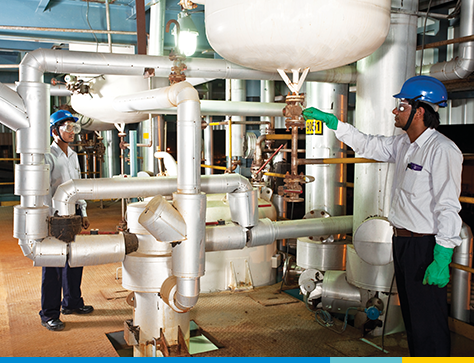SRF Limited acknowledges the significance of proficient and capable human resources in driving a company towards success. Human capital is both valuable and crucial for our business operations and creation of long-term value for its stakeholders. It is our constant endeavour to evolve as a relationship-based Company that recognises and nurtures the unique capabilities of its employees. By offering an environment that supports professional growth, we aim to promote diversity and inclusivity within our organisation.
Occupational Health & Safety
Employment
Permanent employees
Skill development
Training hours
Reduction in LTIFR
Increase of women in management roles
SRF Limited is committed to creating a safe and healthy work environment that helps increase productivity and enhance employee happiness. Our people-centric policies, established by the human resource team, help us in ensuring and engaging a participatory workplace.
We believe in building and nurturing relationships with all our stakeholders, by treating them with respect and dignity
We stand by our commitments and do not compromise on our ethical and moral standards
We do not discriminate on account of gender, caste, religion, creed, region, language, physical disabilities, etc.
We believe that happy employees are key to organisational success
We use the SRF Management Way to pursue excellence in all that we do
Maintaining a high level of employee engagement is the cornerstone of SRF’s human resource management philosophy. The Company regularly organises employee engagement activities to foster strong relationships with its employees. SRF has adopted a systematic approach to assess employee satisfaction levels through an annual Employee Engagement Survey, which is crucial in identifying critical areas for improvement, key issues or concerns, and recommendations for future action plans. According to the survey, overall employee engagement score was 91%. The Company also conducts external surveys, such as the Gallup Survey and the eNPS, which offer anonymous feedback options to employees. Open houses and discussions with senior management are held regularly to gather feedback from employees, which helps in improving the employee’s overall well-being.
Detailed break-up of SRF’s workforce is presented below:
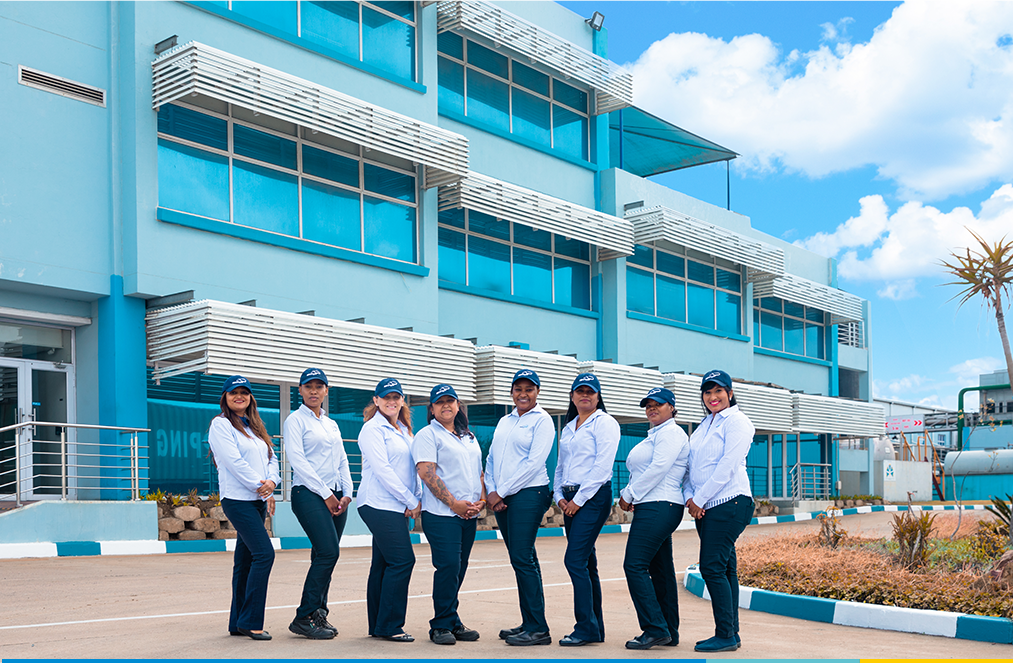
SRF Limited firmly believes that the growth and development of its employees are directly linked to the growth of the organisation. In line with this philosophy, we offer on-the-job learning modules and training programmes to all employees, providing them with opportunities to develop and enhance their skills and competencies.
To keep pace with changing organisational needs and boost employee morale, we have established a well-managed Training and Development process, which includes regular training programmes and modules divided into three categories: Technical, Behavioural, and Functional. Our process identifies individual training needs and creates an annual training calendar for all employees, and we also offer customised training programmes to achieve the desired outcomes. Keeping pace with new requirements imposed by the changing environment, our focus on development has shifted from being reactive to proactive.
For the year ahead, we will add focus on building “Agility”, “Resilience”, and “Change Management” apart from the list of other core competencies.
At SRF, we believe in instilling a culture of safety in the workplace. We conduct regular safety and self-defence trainings, fitness classes, and employee assistance programmes as part of our well-being initiatives.
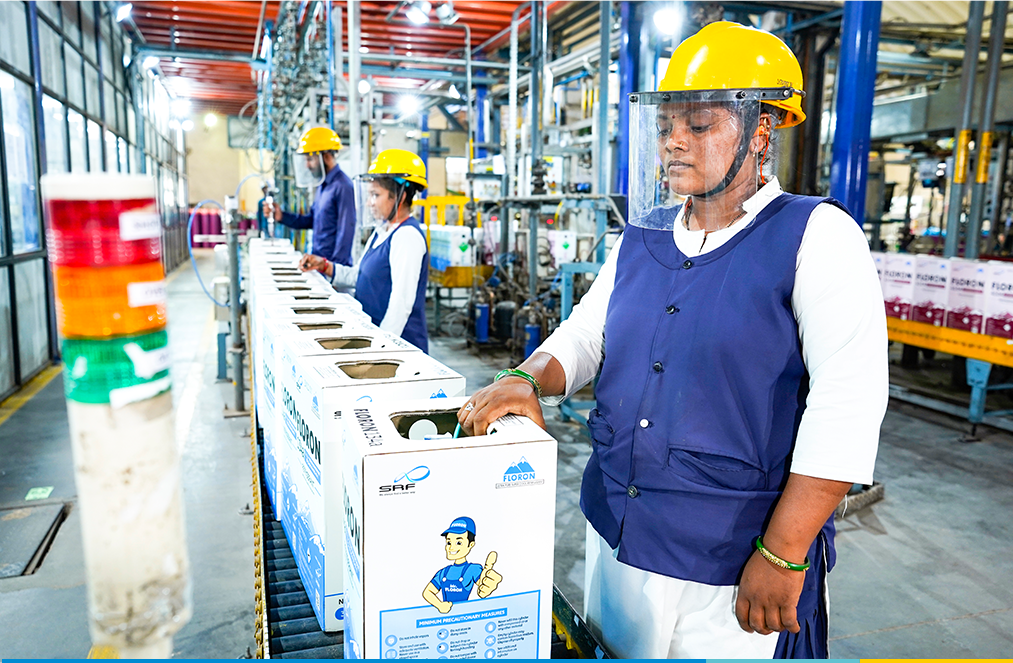
Our skill evaluation system enables us to evaluate and improve the skill level of our employees. The skill level measurement is based on 3 core parameters: Assignment, Observation, and Interview, with each having different weights. As a practice, we annually evaluate a majority of our employees on their skill sets over a range of technical parameters including but not limited to the following:

SRF Limited is actively working towards fostering an empowering environment that embraces diversity and inclusion. The Company is deeply committed to promoting a workplace that is free from any form of harassment or discrimination, basis factors such as gender identity, age, ethnicity, sexual orientation, disability, faith, or marital status. As part of this commitment, SRF has adopted the Women’s Empowerment Principles, joining forces with 3,000 other organisations worldwide in partnership with UN Women to drive gender equality. These principles emphasise the business case for corporate action to promote gender equality and women’s empowerment. SRF is an equal opportunity employer that places a premium on maintaining a gender-balanced workforce. The Company focusses on sensitising all employees, especially leaders, to continuously challenge hidden biases and provide policies that support and encourage people from diverse backgrounds.
SRF Limited has a history of safeguarding and preserving human rights, and opposes all forms of discrimination and human rights abuses. The Company has a zero-tolerance approach towards human rights violations. Developing and maintaining an ethical culture that places the highest priority on human rights necessitates strong leadership commitment. SRF’s Human Rights Policy covers the following aspects:
The Code of Conduct and the Whistle-blower policies are the pillars of the Human Rights policy in the organisation. SRF strictly adheres to the protection of human rights with its suppliers and contractors and does not employ individuals under the age of eighteen. The use of forced or compulsory labour is also prohibited across all units and discouraged with business associates and partners such as suppliers and contractors.
SRF provides a healthy work environment and offers equal growth opportunities to all its employees. The Company’s leave policy includes provisions for maternity and paternity leaves for all employees. Equal opportunities are provided to those who re-join after availing of parental leave.
Detailed break-up of parental leave entitlement and usage of these by employees in the last three years is highlighted below:
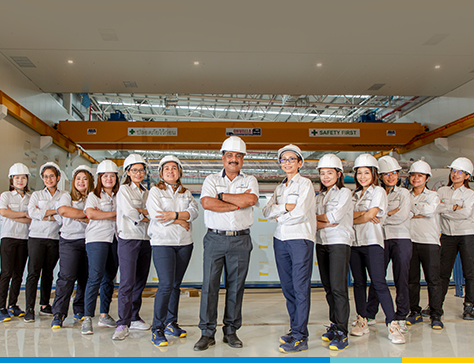
Performance development reviews and feedback are critical pillars that shape the growth trajectory of employees in an organisation. SRF Limited has adopted a robust performance review and career development system to sustain a fair and transparent culture. All employees, at all levels, are evaluated, and assessment reports and KPIs are created accordingly.
To maintain an open and transparent work culture, managers are encouraged to use 360-degree feedback mechanisms to receive regular feedback and adjust their working style accordingly. SRF’s compensation philosophy ensures the promotion of meritocracy and rewards that are in line with a role’s market value. The Company maintains a high percentile position in the talent marketplace, particularly for critical roles and resources. All roles are evaluated using a reliable methodology, and grade structures are implemented every 2-3 years to remain aligned with the market.
SRF Limited has put in place a Rewards and Recognition program that is solely based on merit and serves to encourage and retain a diverse and talented workforce. The program offers various forms of recognition, including monetary and non-monetary rewards, informal day-to-day acknowledgements, as well as semi-formal and non-monetary recognition.
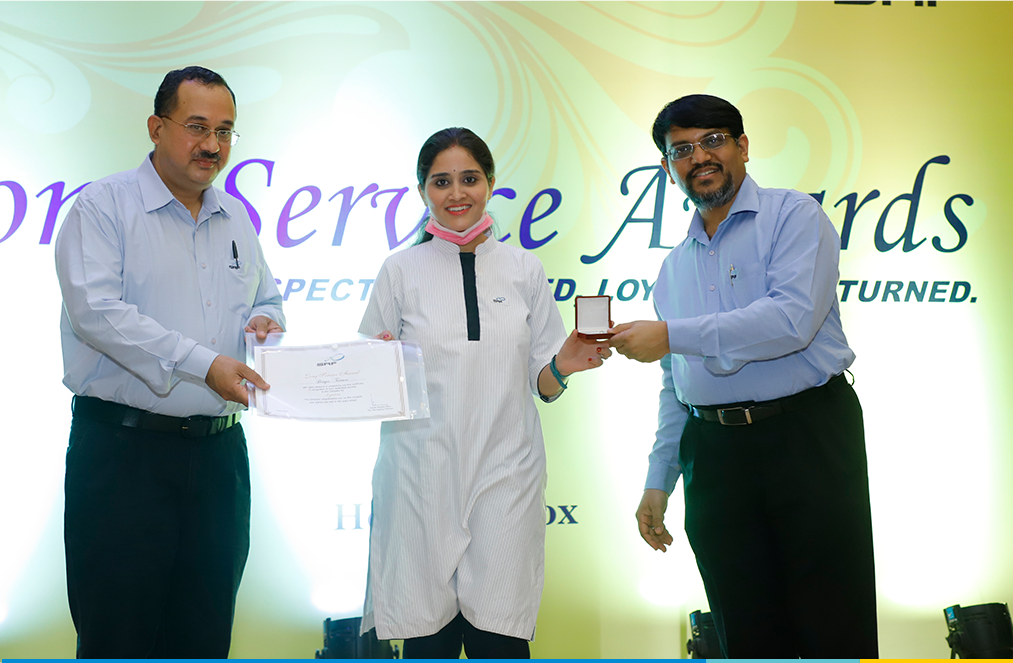
With a view to place a higher focus on reward and recognition, SRF Limited has named its Rewards & Recognition policy - PRAISE. This policy offers several modes of recognition, both formal and informal, that are available to our managers who are empowered to recognise. Some of these avenues include spot awards, special achievement or significant contribution awards, birthday vouchers, well done, thank you, and nice idea cards, along with the annual “Protsahan” awards. In addition, local HRs organise in-person or group recognition events regularly to ensure that awardees receive public appreciation.
Mechanisms SRF Limited acknowledges the importance of grievance redressal systems and leverages them to enhance stakeholder relationships and facilitate smooth business operations. The Company has established structured grievance procedures that enable effective policy implementation, safeguarding of human rights, and promoting sustainable practices. SRF provides multiple channels for employees to voice their feedback and suggestions, fostering an inclusive work culture throughout the organization
For this purpose, ‘People Redbook Systems’ has been put in place at various locations. This grievance-handling systems serves as a platform for employees to voice their grievances. Employees and workers are provided with complaint and suggestion boxes in offices and plants where they can anonymously submit their grievances. The grievance procedures are clearly outlined and follow a fair and independent resolution process while maintaining confidentiality.
SRF Limited believes in creating a culture of open communication to build a strong and healthy relationship with its workers. The Company has implemented rigorous systems such as SA 8000 across several plants, which monitor and ensure the well-being of workers and maintain a safe and productive work environment. Additionally, SRF has established various committees comprised of representatives from both management and workers, providing a platform for transparent communication. These committees include employee associations, canteen committees, health and safety committees, among others, and greatly contribute to the satisfaction and well-being of workers. Management recognises these associations and encourages interaction and issue resolution between management and employees. Currently, employee associations have around 11% of employees/workers as members.
The SRF Limited’s way of management is built on the principles and methods of Total Quality Management. This management system is based on the triad of satisfying requirements of stakeholders and customers today and tomorrow, by applying systematic and scientific methods and tools and involving every employee in making ongoing improvements.
The application of TQM practices cuts across the entire value chain of SRF’s businesses, from product conceptualisation, development, projects, manufacturing operations, and sales, and to the support and enabling functions as well. Guided by the Company’s values of promoting customer centricity and ‘Easy to Do Business With’, the TQM way of working enables us to flexibly adapt to evolving customer aspirations and shifting market dynamics, to deliver diverse solutions to customers while maximising efficiency in operations. The methods of TQM are applied in determining the best strategic choices as well as achieving superior operational outcomes of QCDSM.
SRF Limited recognises the need to continually improve its processes to stay competitive in the market. The Company has adopted a structured approach to Kaizen implementation that involves identifying areas for improvement, analysing the root cause of the problem, implementing solutions, and monitoring and measuring the results.
SRF Limited firmly believes that ensuring a safe and healthy working environment for its workforce is a fundamental aspect of conducting business. The Company takes responsibility for educating its employees on safety practices, training them to deal with adverse events, and preventing such incidents. This is accomplished through regular safety training and mock drills. SRF aims for zero incidents of injury, fatality, or accidents across all its plants and manufacturing units. The Company handles, stores, and distributes its products in an environmentally conscious manner, deploying emergency response plans, safety procedures, and processes to create a healthy and safe workplace. EHS committees have been formed across plants to inculcate a safety-oriented culture across the organisation. This helps in proactively identifying and avoiding safety incidents, with systems in place to monitor and address issues at an early stage and take pre-emptive measures. SRF conducts health and safety training for the entire workforce, focussing on behavioural change at the shop floor level through continuous training, awareness programmes, and proactive identification of unsafe situations in the following areas: -
Safety training is being conducted in three different categories at different sites:
